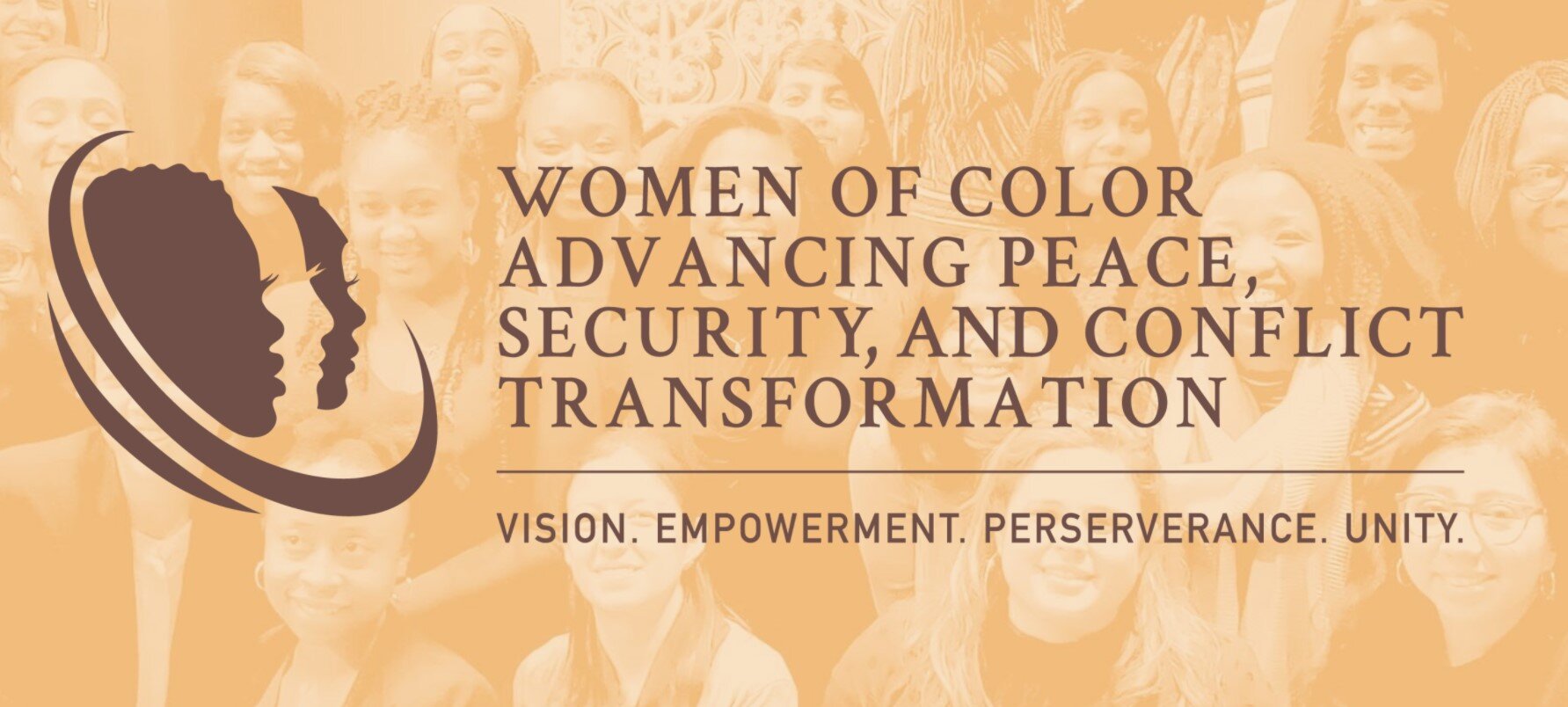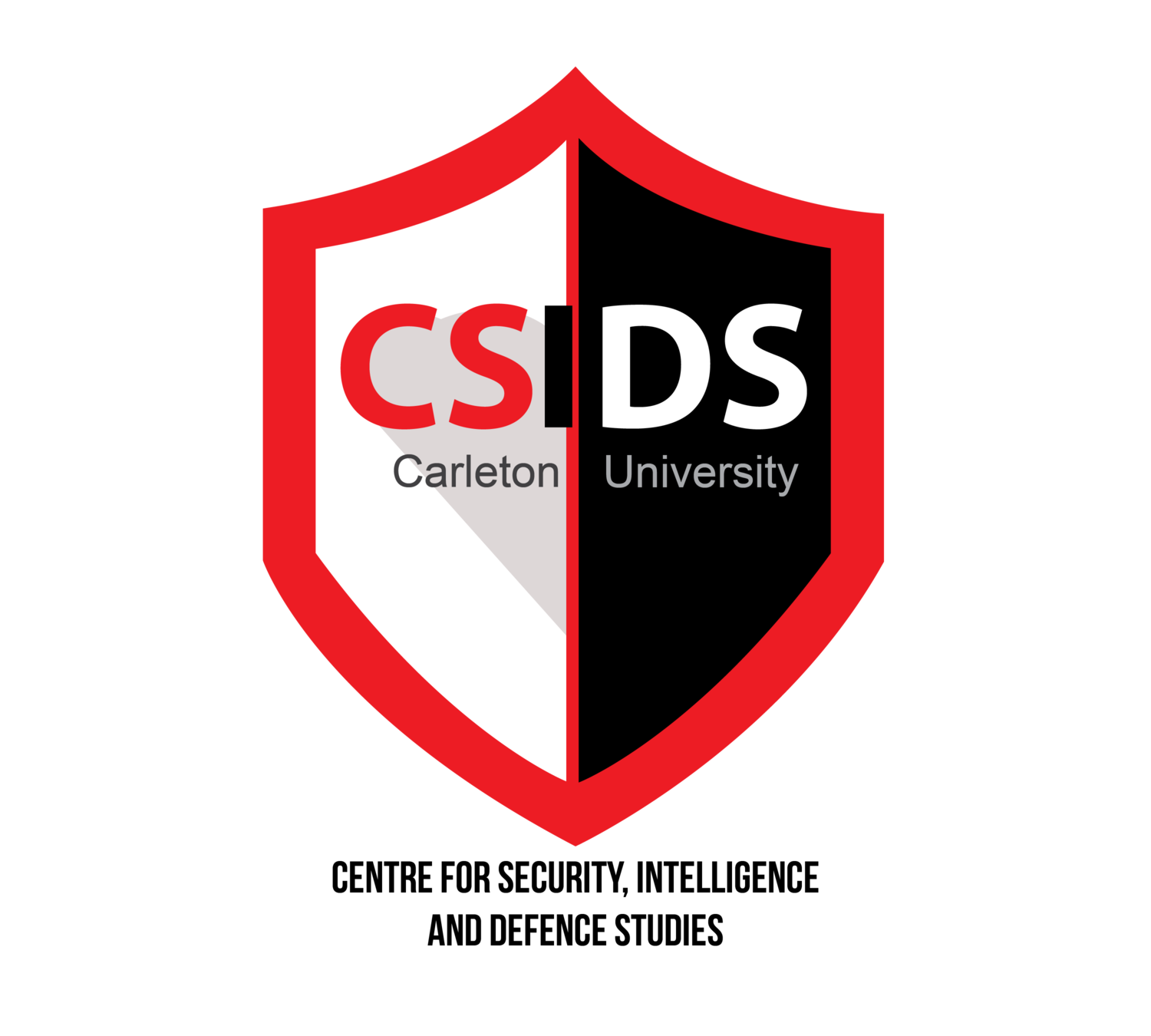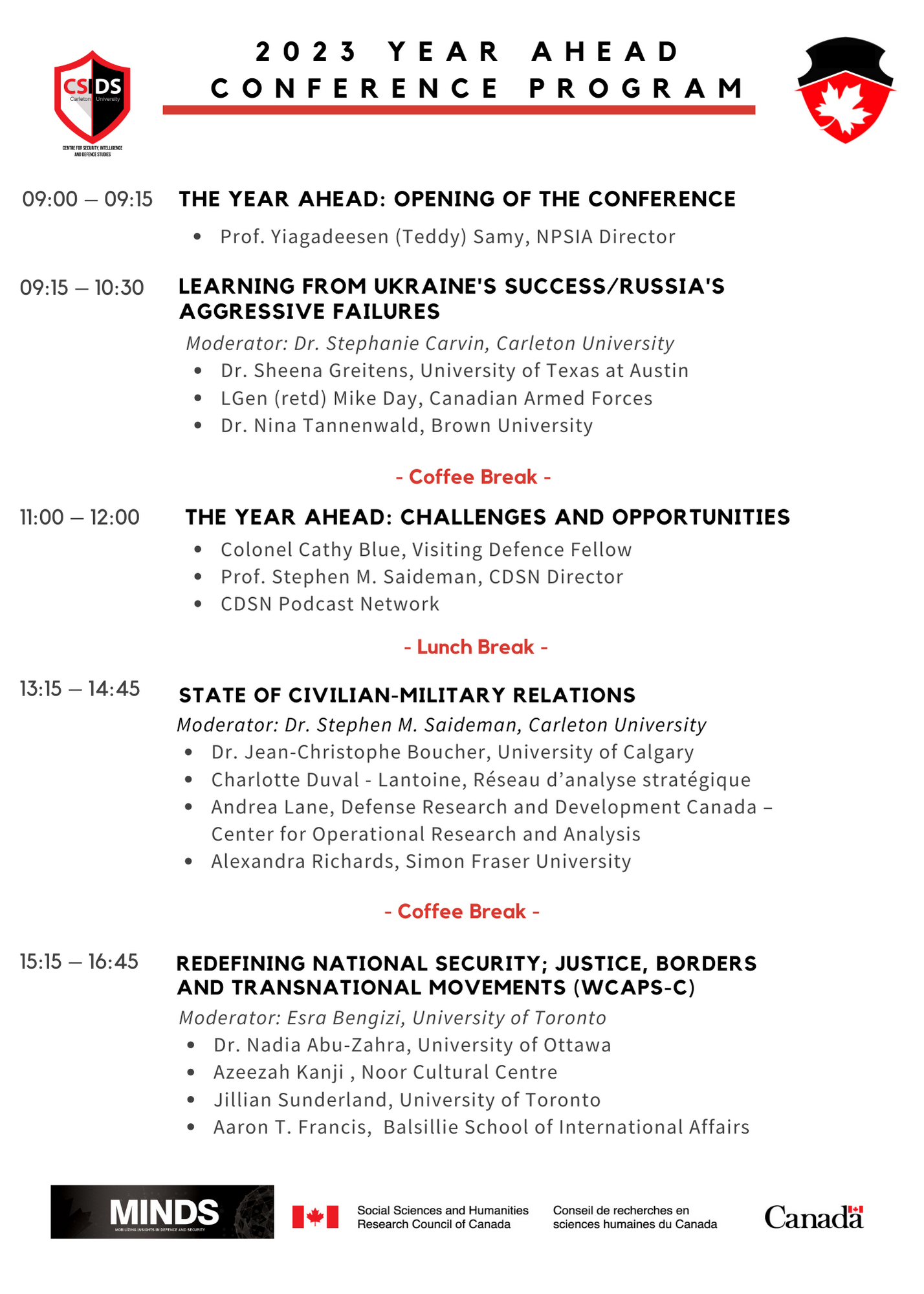Welcome to the 2023 Year Ahead!
#YearAhead2023
When: Dec 9, 2022 09:00 AM Eastern Time (US and Canada)
Topic: Carleton University - Virtual Webinar
Register in advance for this webinar:
https://baldwinav.zoom.us/webinar/register/WN_Vn9LeIY_SW2KPxNv0OWaBg
After registering, you will receive a confirmation email containing information about joining the webinar.
Opening Address of the 2023 Year Ahead
Prof. Yiagadeesen (Teddy) Samy, NPSIA Director
Yiagadeesen (Teddy) Samy is a Professor of international affairs and currently the Director of the Norman Paterson School of International Affairs (NPSIA). He joined NPSIA in 2003 and since then has taught graduate courses in development economics, international trade, macroeconomics, development assistance and quantitative methods.
Learning From Ukraine’s Success / Russia’s Aggressive Failures
09:15 -10:30
-

Moderator: Dr. Stephanie Carvin
Stephanie Carvin is an Associate Professor of International Relations at the Norman Paterson School of International Affairs. Her research interests are in the area of national security and international security and international law. Currently, she is teaching in the areas of critical infrastructure protection and national security.
-

Dr. Sheena Greitens
Sheena Chestnut Greitens is Associate Professor at the LBJ School of Public Affairs at UT-Austin, where she directs UT's Asia Policy Program, a joint initiative of the Clements Center for National Security and the Strauss Center for International Security & Law. She is concurrently a Jeane Kirkpatrick Visiting Fellow at the American Enterprise Institute (AEI).
Dr. Chestnut Greitens' research focuses on American national security, East Asia, and authoritarian politics & foreign policy. Her first book, Dictators and their Secret Police: Coercive Institutions and State Violence (Cambridge, 2016) received multiple academic awards. Her second book, on authoritarianism and diaspora politics, is focused on North Korea and forthcoming later this year from Cambridge University Press (Elements Series in East Asia). She is currently finishing her third book manuscript, on internal security and Chinese grand strategy.
Her work has appeared in academic journals and edited volumes in English, Chinese, and Korean, and in major media outlets, and she regularly testifies to Congress on issues of security and democracy in the Indo-Pacific. From 2015-2020, she was an assistant professor of political science at the University of Missouri and co-director of the University's Institute for Korean Studies. She was also previously a non-resident senior fellow at the Brookings Institution, and an adjunct fellow with the Korea Chair at the Center for Strategic and International Studies. She holds a doctorate from Harvard University; an M.Phil from Oxford University, where she studied as a Marshall Scholar; and a bachelor's degree from Stanford University.
-

Lieutenant General (Retired) D. Michael Day
L-Gen Day has commanded at every level and rank in a variety of units and deployments around the world. The majority of his field and command time has been as an Operator within Canada’s Counter Terrorist and Special Forces unit, commanding both Joint Task Force Two (JTF 2), and Canada’s Special Operations Forces Command. Mike also served in a number of Senior Staff appointments including the Canadian Armed Forces as a senior Military Officer in the Defence Policy Group and the Chief Strategic Planner for the future of the Canadian Armed Forces.
Following his time with the military, Mike has supported a number of private sector boards and serves as the president for his regimental charity. He will be a familiar face to many in the defence community, serving as a frequent moderator and host of sessions offered by the country’s leading defence associations.
-

Dr. Nina Tannenwald
Nina Tannenwald is Senior Lecturer in the Political Science Department and former director of the International Relations Program at Brown University's Watson Institute for International Studies. Her research focuses on the role of international institutions, norms and ideas in global security issues, efforts to control weapons of mass destruction, and human rights and the laws of war. Her book, The Nuclear Taboo: The United States and the Non-use of Nuclear Weapons Since 1945 was awarded the 2009 Lepgold Prize for best book in international relations. Her current research projects include targeted killing, the future of the nuclear normative order, and the effectiveness of the laws of war. In 2012-2013 she served as a Franklin Fellow in the Bureau of International Security and Nonproliferation in the U.S. State Department. She holds a master’s degree from the Columbia School of International and Public Affairs and a Ph.D. in international relations from Cornell University.
The Year Ahead: Challenges and Opportunities
11:00 - 12:00
-

Colonel Cathy Blue
Colonel Cathy Blue was born and raised in Hopefield, Prince Edward Island and developed her love for the Royal Canadian Air Force as an Air Cadet. Enrolling in the Canadian Forces in April 1989 as a Communication and Electronic Engineer (CELE), Lieutenant-Colonel Blue attended the University of Prince Edward Island under the Regular Officer Training Program.
Colonel Blue has served in numerous operational and training positions across the Canadian Armed Forces, including positions within 8 Wing Telecommunication and Information Systems Squadron (WTISS), J6 Operations, 76 Communications Group and the Canadian Forces School of Communications and Electronics (CFSCE).
Colonel Blue has had the honour of holding numerous command positions throughout her career as Commanding Officer 708 Communication Squadron, Commanding Officer 8 Air Communica-tions and Control Squadron (8 ACCS) and as Commanding Officer 8 Mission Support Squadron. All were unit located on the largest Wing in the RCAF – 8 Wing Trenton. GO FLYERS!
Colonel Blue has been posted to the Canadian Forces College (CFC) as Directing Staff for the Joint Command and Staff Programme (JSCP) and Programme Officer for the National Security Programme (NSP) followed by a posting to the RCAF Strategic Headquarters as Deputy Strate-gic A6 and Deputy Occupation Advisor for CELE.
She was most recently posted to newly formed Chief Professional Conduct and Culture (CPCC) as the Special Advisor to Lieutenant-General Carignan Chief, Professional Conduct and Culture.
Colonel Blue holds a Bachelor of Science degree in Physics and Computer Science from the University of Prince Edward Island, is a graduate of JCSP and holds a Masters in Defence Stud-ies from the Royal Military College of Canada. She is an avid hockey player, who (despite a four year posting to Toronto) remains a dedicated Ottawa Senators fan.
Colonel Blue is married and the couple have two sons.
-

Prof. Stephen M. Saideman, CDSN Director
Stephen M. Saideman is the Paterson Chair in International Affairs at Carleton University. His research interests focus on the causes and consequences of intervention into intra-state conflicts. He has written books on the international relations of secession, why there were both more and less wars in Eastern Europe after the end of the Cold War, on NATO in Afghanistan, and on Canada’s Afghanistan experience. His current research focus is on the role of legislatures in democratic civil-military relations. He teaches courses on Contemporary International Security, Civil-Military Relations and US Foreign and Defence Policy. stevesaideman.com
-

The Canadian Defence and Security Network
The CDSN is a partnership of nearly forty institutions, ranging from academic research centres to components of the Department of National Defence and Canadian Armed Forces to civil society organizations in Canada and beyond, and over a hundred members. The CDSN aims to:
Create a coherent, world-class research network of defence and security experts;
Advance the body of knowledge in Canadian defence and security studies;
Tailor research initiatives to Canadian defence and security priorities;
Improve cross-sector information and data sharing in the defence and security field;
Improve the defence and security literacy of Canadians;
Build the next generation of defence and security experts in academia, in government and in the private sector, with an emphasis on equity, diversity and inclusion.
Funded by the Social Sciences and Humanities Research Council, the CDSN organizes conferences, summer institutes, workshops, research assistantships, internships, podcasts, and a variety of other activities to build bridges between the various parts of the Canadian Defence and Security community.
Fireside Chat: CDSN Podcast Network
-

Battle Rhythm
Battle Rhythm is hosted by Stephen Saideman, Anessa Kimball, Artur Wilczynski, Erin Gibbs and Linna Tam-Seto, and released every second Wednesday, features timely discussion on the defence and security issues of the day, as well as feature conversations with experts.
-

Balado Conseils de sécurité
Présenté par Sarah-Myriam Martin-Brûlé et l' invité, et publié un mardi sur deux, Conseils de sécurité traite de questions de sécurité et de défense en français. Coproduit avec le Réseau d’analyse stratégique (RAS) et le Réseau canadien sur la défense et la sécurité.
-

Securityscape
Securityscape is a monthly podcast produced by graduate students from the Centre of Military, Security, and Strategic Studies. Each episode highlights scholars and students and the important research they are conducting relating to security.
-

The Field Report
The NATO Field School will bring you field reports via a ‘special’ (occasional) podcast featuring the NATO Field School staff, students, and guest speakers. Each episode will be moderated by NFS staff and students and themed to a particular topic, discussing key takeaways and unique perspectives while discussing this topic with experts and decision-makers in the field. https://www.sfu.ca/politics/natofieldschool.html
State of Civilian - Military Relations
13:15 - 14:45
-

Moderator: Dr. Stephen M. Saideman
Stephen Saideman holds the Paterson Chair in International Affairs at Carleton University’s Norman Paterson School of International Affairs and is the Director of the Canadian Defence and Security Network. He has written four books: The Ties That Divide: Ethnic Politics, Foreign Policy and International Conflict; For Kin or Country: Xenophobia, Nationalism and War (with R. William Ayres); NATO in Afghanistan: Fighting Together, Fighting Alone (with David Auerswald); and Adapting in the Dust: Lessons Learned from Canada’s War in Afghanistan, as well as articles and chapters on nationalism, ethnic conflict, civil war, alliance dynamics, and civil-military relations. Prof. Saideman has received fellowships from the Council on Foreign Relations and the Social Sciences Research Council. The former placed on the Bosnia desk of the Strategic Planning and Policy Directorate of US Joint Staff for a year, and the latter facilitated research in Japan. He taught previously at the University of Vermont, Texas Tech University, and at McGill University. He writes online including at his own site (saideman.blogspot.com). He has won awards for teaching, for mentoring other faculty, for public engagement, and for his blogging on international studies. He is currently working on the role of legislatures in civil-military relations in many democracies around the world. He tweets at @smsaideman, and co-hosts the Battle Rhythm podcast.
-

Dr. Jean-Christophe Boucher
Jean-Christophe Boucher is an Associate Professor at the School of Public Policy and at the Department of Political Science at the University of Calgary. His current work focuses on applied machine learning to understand how the digital world shapes our society. He is currently holding grants from the Department of National Defence (DND) to study information operations; the Social Science and Humanities Research Council (SSHRC) to understand civil-military relations in Canada; and holds grants from Alberta Innovates, the Vaccine Confidence Fund and Merck to study vaccine hesitancy on social media to develop better communications strategies and tools to increase vaccine uptake. He holds a BA in History from the University of Ottawa, a MA in Philosophy from the Université de Montréal and a PhD in Political Science from Université Laval. He specializes in international relations, with an emphasis on foreign policy, international security, and data analytics.
-

Charlotte Duval-Lantoine
Charlotte Duval-Lantoine is the Ottawa Operations Manager and a Fellow at the Réseau d’analyse stratégique. She completed a Master in Military History at Queen’s University, during which she started researching on the toxic culture of leadership in the Canadian Armed Forces during the 1990s and its impact on gender integration, which had started in 1989. She continues to study leadership and culture change issues in the military in her free time. She obtained her BA in History and Political Science at McGill University in 2017. During her graduate studies, Charlotte served as the Assistant to the Executive Director of Women In International Security-Canada for the fiscal year 2018-2019. She has also worked as a research assistant and translator on projects about gender mainstreaming and integration in NATO Armed Forces, and on the gendered dimension of veteran transition at Queen’s University Center for International and Defence Policy (CIDP).
-

Andrea Lane
A strategic analyst with DRDC-CORA, Andrea's personal research focusses on the intersection of national defence, politics, and society, examining the military as an institution, civil-military relations, personnel policy, and procurement. Her dissertation project investigates the role of gender in Canadian civil-military relations. Prior to joining DRDC in 2021, Andrea taught at Canadian Forces College, Toronto, and at Dalhousie University in Halifax. Andrea’s work has been published in International Journal, Canadian Foreign Policy Journal, and the Canadian Naval Review, as chapters in several books, and in popular venues such as Policy Options. She is the co-editor, with Brian Bow, of Canadian Foreign Policy: Reflections on a Field in Transition, published by UBC Press (2020).
-

Alexandra Richards
Alexandra Richards is currently completing a PhD in Political Science at Simon Fraser University. Her primary research interests are generational theory, public opinion on security and defence issues, international relations, and strategic culture. Her research examines how different generations (Baby Boomers, Gen X, Millennials, Gen Z) view security and defence issues and asks whether generational shifts may alter how we approach security and defence issues in the future. Her research also examines the ways in which culture (generational or strategic) can constrain and shape decisionmakers’ perceptions and decisions on security and defence issues.
Through her work as Assistant Field School Director for the NATO Field School program from 2018-2021, she has also developed an interest in pedagogy, more specifically, how simulations, experiential learning, and field study can impact and enrich student learning.
Redefining National Security: Justice, Borders and Transnational Movements (Organized by WCAPS -C)
15:15 - 16:45
-

Moderator: Esra Bengizi
Esra Bengizi is a Doctoral Candidate at the University of Toronto. Esra is the co-director and founder of the WCAPS (Women of Colour Advancing Peace & Security) Canada Chapter. Esra specializes in post-colonial and feminist studies in the North African region. Her scholarship examines the intersection of politics, culture, and gender in Algeria as well as the modern Maghrib to explore the role of women in political movements. Her work and research is rooted in people power, systemic oppression, post-colonialism and a feminist, de-colonial approach to human rights. Esra is a researcher, lecturer and social justice activist. She works alongside several community members, institutions, governments and organizations to work on solutions related to peace and security, gender inequality, gender-based violence, systemic racism and terrorism
-

Azeezah Kanji
Azeezah Kanji is a legal academic and writer. She received her Juris Doctor from University of Toronto’s Faculty of Law, and Masters of Law specializing in Islamic Law from the School of Oriental and African Studies, University of London. Azeezah’s work focuses on issues relating to racism, law, and social justice. Her writing has appeared in the Al Jazeera English, Haaretz, Toronto Star, TruthOut, National Post, Ottawa Citizen, OpenDemocracy, Roar Magazine, iPolitics, Policy Options, Rabble, and various academic anthologies and journals. Azeezah also serves as Director of Programming at Noor Cultural Centre
-

Aaron T. Francis
Aaron T. Francis is a doctoral student at the Balsillie School of International Affairs at the University of Waterloo, researching the political economic intersections of China-US-Taiwan relations in Latin America and The Caribbean. Aaron is also an archivist, curator and the founder a Vintage Black Canada, a multidisciplinary creative initiative documenting the transnational modern history of the African Diaspora in Canada.
-

Dr. Nadia Abu-Zahra
Dr. Abu-Zahra is an Associate Professor in the School of International Development and Global Studies at the University of Ottawa, and a member of the Human Rights Research and Education Centre.
She co-facilitates, with Professor Emily Regan Wills, “Community Mobilization in Crisis”, a project that co-creates open educational resources with community mobilizers around the world in multiple languages, and supports the use of the resources transnationally to build community mobilizations.
Dr. Abu-Zahra has written on a variety of topics, including gender justice in colonial and conflict situations, and the implications of geographic (im)mobility for education and health. She has a longstanding interest in pedagogy, works closely with university services and research groups in teaching and active, experiential, and community-engaged learning, and was a finalist for the Ottawa Network for Education’s Capital Educators’ Award. Her research focuses on the everyday consequences and spaces for agency in situations of crisis and, most recently, on the role of higher education institutions in transforming power relations and opening spaces for healthy and accountable relations
Dr. Abu-Zahra invites members of the student and faculty community, as well as feminist organizations from the local to the transnational levels, to join in communities of practice with the theme, “Sharing Feminist Pedagogy and Mobilising Solidarity in Our Learning Environment”.
These communities of practice will be opportunities to share experiences and interests in learning and in transforming the structures and contexts of learning, with inspiration from the diverse but often under-celebrated initiatives that abound in these communities. Dr. Abu-Zahra will also facilitate credit-bearing seminars in “Feminist Pedagogy, Community Mobilization, and Learning”.
-

Jillian Sunderland
Jillian Sunderland is a Sociology Ph.D. student at the University of Toronto and a Joseph-Armand Bombardier Doctoral scholar. Her academic focus is on masculinities, power, and violence, but she frames these issues in relation to anti-black racism and settler colonialism in Canada. Throughout her work she typically employs document and narrative analysis to archival, media, web forums, governmental documents, and policy reports. She recently published her first academic article in the journal of Men and Masculinities; where she provides a summary and a brief commentary on this project in an interview for U of T News. She also recently published a first-person article for CBC National News. Jillian Sunderland is committed to engaging in public sociology, and my sociological insights can be found in The Medium, The Varsity, CBC Radio, and CBC Kids News.




